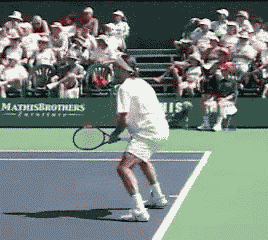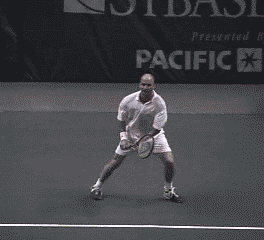
Becoming Mentally Tougher in Matches
This article is designed to help serious players develop a routine in their preparation for matches, so they can improve their consistency of performance and fulfil their potential more often. The information is based on true examples of techniques that have worked and still are working for elite performers.

I will begin with answering the most common statement made by players, parents and often coaches. “If only I (he or she) had more confidence and was mentally tougher I (he or she) would be so much better!” The implication is that confidence, belief and mental toughness are types of magic, an illusive gift only the lucky few possess. Absolute rubbish! Granted some are more adept at learning how to succeed at a young age, but it is not beyond anyone to learn how to be tough.
A player would never enter a tournament without hitting a ball for three weeks but he would quite easily go into a tournament without doing any mental practice for months, yet wonder why his mind is weak. Your game gets good with practice; your body gets fit and strong with training and your mind gets sharp and strong with - you guessed it – not by luck or chance, but with practice.”
Consistency is the Magic of Success
Consistency must be part of your life for longer than you think if you are to succeed – so long that it becomes part of the way you think. The more consistently you practice something the more professional you become.
Do not be frightened, because this doesn't take hours nor is it very difficult to do. It requires the desire to follow through consistently, applying oneself for 5-10 minutes each day, every day. Let me repeat – each and every day.
I would like you to begin this program with the attitude of a reformed alcoholic whose motto is “Each day is a recommitment to stay sober. Each day I have to prepare myself to be strong and resist the temptation of giving in to weakness and the short lived pleasure of a drink.” Think how little you lose when you do not prepare compared to the alcoholic.
Perhaps there is not enough at stake. Perhaps losing out on a top class career, Tour titles, a Grand Slam or millions of dollars plus the pride of knowing you have not let yourself down in reaching your potential is not a big enough stake. Perhaps the honesty of consistent effort to be a good pro and the peace of mind that that success alone gives you is not enough.
Fine but then admit that you are perhaps a talented ‘cruiser,’ a top class social player rather than a dedicated pro. This is not a crime and too often it is frowned upon when a player settles at a certain level. Yet in everyday life it is often applauded when a businessman decides he will not sacrifice more family time or leisure time to get further ahead. We call that getting out of the ‘rat race’ yet becoming a tour pro is the equivalent of operating in a ‘rat race’ environment that is possibly even tougher.
How to Prepare Yourself Mentally to Think Like a Top Performer?
Preparing oneself mentally can fall into two categories.
-
Long-term preparation
-
Preparing for a match
Again do not be frightened because you think what I am about to tell you will take hours or is very difficult to do. It requires the desire to follow through consistently, applying yourself for 5-10 minutes most days.
Long-term preparation
Understand that confidence, belief and toughness are affected by the way you talk to yourself and then by the actions you take.
Are you committed to start?
“Confidence is the habit of how well you talk to yourself. Become your own parent and feed yourself nourishing and encouraging words to encourage the mental growth to becoming a confident adult. Build belief and trust in yourself in six months by repeating on and off the court positive self-statements that work for you.
I recommend reading through and contemplating the following routine most days and anytime you want a lift. You need to experiment and find self-statements that lift and energize you, ones that work and which are relevant to you. Here are some examples of useful self-statements.
1. I am good. I can do this.
2. My talent grows every day. I believe in myself and the quality of my practice.
3. I am good enough now. I do not need to think “one day” I will be good enough because I am prepared to fight 100% no matter who I play or where I play and know that this is all I expect.
4. No one point is going to decide the outcome but the last one.
5. This is my day. I will win or I will learn so I always win.
6. I love pressure! I love to intimidate opponents with how cool, relaxed, and aggressive I am under pressure.
7. A challenge is fun. Every setback is a new challenge.
8. A problem is just a challenging decision. I will always make a decision.
9. I rarely lose mentally. I’m tough so my opponent better turn up eager to play.
10. I can see myself relaxed, confident and equal to any player. I congratulate any opponent who on the day or at present plays better than me.
11. Nerves are good. They tell me I’m ready. I also know my opponent better be nervous and will be nervous because we are all human.
Sometimes perform your self-statements out loud in front of a mirror looking straight into your own eyes. Just think! If you can’t do this privately how comfortable are you with yourself. I know you might feel embarrassed the first few times. However, it is imperative that you get comfortable with yourself as a person if you are to succeed.
Long-term preparation is a journey of investigation into yourself and the excellent knowledge all around us, but beware of the “always searching syndrome and the complex confusion syndrome.” Keep your method short and simple. Adjust it with learned experience and always use a method that suites your unique personality.
Every champion is mentally tough in their own way and can be tougher because all humans make mental mistakes, especially under pressure. Champions, however, consistently work to improve because standing still is not an option if you value your position.
Preparing For a Match
I cannot stress enough the importance of trying different mental strategies and finding a routine and method that works for you. Every mental skills article, book, seminar and DVD will have similar messages presented in different ways. Use them to find your unique way of becoming mentally tough. Here are a few dynamics that in my experience happen before a match and need to be dealt with before you step onto the court.
A player seriously diminishes his chances if he is afraid. Often a player will simply brush this feeling under the carpet and pretend it is not happening or ignore it. Face fear head on with a plan. Decide exactly how to use what weapons you have to strike fear into your opponent’s heart. Decide to take on his biggest weapon as soon as possible and make a statement against it. Picture over and over again how you will hurt your opponent until you become mentally excited to play this person.
How can one be mentally tough when one is being outplayed or simply playing terrible? Again plan for this! I recommend setting small achievable targets within the match. For Example:
“I will make two returns this game.”
“I am looking for one opportunity to get to the net in this game.”
“I will rally for six balls every point before taking a risk.”
“I will win one more game.”
By being motivated to win a small skirmish you may build momentum and win a battle and then the war. Only your imagination can limit your targets.
Picture your method of play and put your game on the court. There is no point in tactically playing in a way that you never practice. You become an expert by playing your game over and over again. See my “Locker Room Power” article for more depth on this subject.

Mentally tough is not trying harder. Mentally tough is a decision to constantly be constructive during the time one has to think. Mentally tough is accepting the possibility of losing and winning and focusing on an action that you will commit to fully. Any decision carried out with conviction is harder to beat than tentativeness, fearful play, or indecision.
Confidence comes and goes for everyone so place the largest chunk of your confidence into your attitude and training. Preparing for a match is so much easier if you know you always compete for small victories and none come smaller than each point. If you think you can’t win the match win a point. This way 0-5 is still interesting. Many a victory has been won by one point changing the momentum and confidence.
None of the above thinking happens without preparing for it. Specific matches can hold new challenges (wind, sun, speed of court, type of ball etc) The key is not to ignore them but to mentally decide how you will handle them before you enter the arena. If you have not prepared a response you may be surprised at your reaction under pressure.
I conclude with the promise that if you prepare your responses often enough experience will soon turn your responses to most situations into positive automatic responses. In other words you will respond to tough questions by posing some tough questions of your own. Mentally you will have learned to be tough!
Pictures used in this article are courtesy of TennisOne

